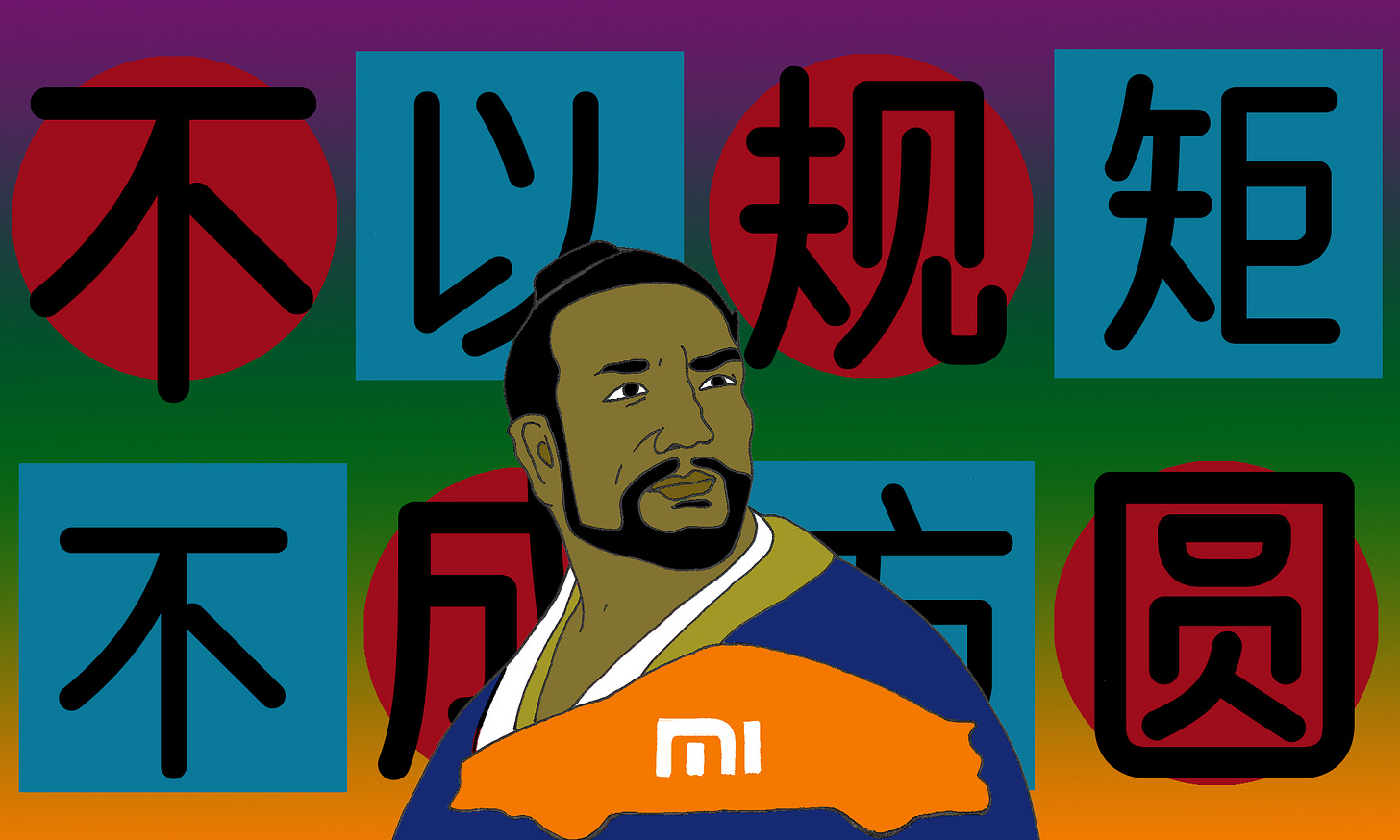"Nothing can be accomplished without rules or regulations" — Phrase of the Week
Aggressive fast-growing EV brands adapt to newly announced marketing guidelines

Our phrase of the week is: "Nothing can be accomplished without rules or regulations" (不以规矩,不能成方圆 bù yǐ guī ju, bù néng chéng fāng yuán)
Context
On April 23, Auto Shanghai—the world’s largest auto show—kicked off in Shanghai with over 1,000 companies in attendance.
This was the biggest so far, but there was one thing missing from this year’s event: terms linked to "smart driving" (智驾) had been removed from most presentations.
Just a week before, on April 16, China’s Ministry of Industry and Information Technology (MIIT) held a meeting which laid out new requirements for car safety testing, and warned against exaggerated marketing claims about automated driving functions—which up until now have blurred the lines between “assisted driving” (辅助驾驶) and autonomous or "smart" driving (高阶智驾).
This follows a fatal crash on March 29 involving a Xiaomi SU7 electric car, in which three university students died after the vehicle, reportedly on autopilot, hit a concrete barrier on the highway at 97km/h.
The tragedy sparked public outcry and renewed scrutiny of China’s rapidly expanding EV sector, which still doesn’t have clear standards or regulations for autonomous driving.
This is why, following the MIIT announcement, carmakers were scrambling to update their promotional materials in the week before Auto Shanghai—removing terms like “smart driving” (智驾), “advanced smart driving” (高阶智驾), and “autonomous driving” (自动驾驶) from their marketing materials.
One observer sums up the sentiment among automakers:
This sudden halt is undoubtedly a painful jolt for carmakers, but it's actually a good thing — the industry can only advance with clear rules and regulations.
这次的急停,对于车企无疑是一场阵痛,但这其实是一件好事——有了“规矩”,才能成更广阔的“方圆”。
Zhè cì de jí tíng, duìyú chēqǐ wúyí shì yì chǎng zhèntòng, dàn zhè qíshí shì yí jiàn hǎoshì — yǒule “guīju”, cáinéng chéng gèng guǎngkuò de “fāngyuán”.
And with that, we have our Sinica Phrase of the Week!
What it means
This has to be one of our favourite Phrases of the Week ever!
It ticks all our nerdy language boxes. It’s:
Confusing—One that native speakers will "just know". But for language learners like you and I? We’ll totally miss it.
Illusive—Hidden in a modern and newly coined construction with two seemingly unconnected parts of the sentence, subtly hinted at with speech marks.
Old and new—this phrase, used in a modern context, has travelled over 2,300 years through time to be with us for this week’s Phrase of the Week.
So let’s jump in.
Any native Chinese speaker will tell you these two words—“rules” and “regulations”—are part of the colloquial phrase:
"Nothing can be accomplished without rules or regulations"
不以规矩,不能成方圆
bù yǐ guī ju, bù néng chéng fāng yuán
It’s traced back to the Book of Mencius (孟子), which was compiled in the 4th to 3rd century BCE, during the Warring States period (战国时期, 475 BCE to 221 BCE).
The full original phrase is found in the chapter, Li Lou, Part I (离娄 上), of the Book of Mencius:
"Even with the keen eyesight of Li Lou and the craftsmanship of Gongshuzi, without a compass or square, one cannot draw a perfect circle or rectangle."
“离娄之明,公输子之巧,不以规矩,不能成方圆。”
"Lí Lóu zhī míng, Gōngshū Zǐ zhī qiǎo, bù yǐ guī jǔ, bù néng chéng fāng yuán."
This requires some explanation.
First, Lí Lóu 离娄 was a legendary figure known for his exceptional eyesight, while Gōng Shū Zǐ 公输子—better known as Lǔ Bān 鲁班—was a master craftsman and inventor from the State of Lu, one of the states which existed during the Warring States period. It was a smaller, weaker state in today’s Shandong province, eventually annexed by the State of Chu just before the Qin unified China in 221 BCE.
Second, the two characters which make up the Chinese word for "rules" (规矩) each refer to a carpenter’s tool:
规 (guī) is a compass, a tool used to draw circles, helpful for making round objects like circular windows or tabletops.
矩 (jǔ) is a carpenter’s square (also known as 曲尺 qǔchǐ), used to draw right angles and ensure straight edges when making rectangular frames or furniture.
Together, they symbolise proper conduct and rules.
Lastly, the two characters in the phrase “方圆”, which in this context literally mean “square” (方) and “circle” (圆), together mean the desired outcome, or accomplishment, of following the rules.
Mencius, who compiled the Book of Mencius, was a Confucian philosopher from the state of Zou (邹). In this teaching, he uses a carpentry analogy to explain that even the most talented of people (like Li Lou, and Lu Ban) need proper standards to achieve anything of lasting and high quality.
In modern Chinese, the phrase, "Nothing can be accomplished without rules or regulations" (不以规矩,不能成方圆) is still widely quoted in business, education, and governance to emphasize the importance of rules and structure.
For China’s evolving EV industry, and its companies, ambition and appealing marketing blurb are not enough—their success depends on robust rules, and recognised standards.
PS—find out more:
Andrew Methven is the author of RealTime Mandarin, a resource which helps you bridge the gap to real-world fluency in Mandarin, stay informed about China, and communicate with confidence—all through weekly immersion in real news. Subscribe for free here.
Read more about how this story is being discussed in the Chinese media in this week’s RealTime Mandarin.
Lastly, RealTime Mandarin is currently offering a 30-day free trial of the RTM membership, which includes one-month of free weekly language learning content (podcasts, newsletters, app integrations), and 1:1 coaching, to immerse you in real news every week, help you finally shake off that “rusty” feeling, and get back to communicating with confidence—all for free for one month. The deadline to claim this offer is Monday May 5. Join for free here:



I love this! Thank you!